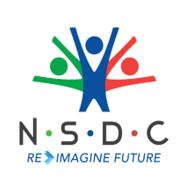|
Enterprise Showcase
Dialogue with
CA Vinita Jain, Vice President, Impact Financing, NSDC
Barkat Ul Nisa, Deputy General Manager, NSDC
|
|

1
Skilling initiatives have been central to India’s workforce development strategy for years. Based on NSDC’s experience, what are the most significant shifts in demand for skills and jobs over the past decade, particularly in the high-growth sectors?
|
As India advances on its path to becoming a knowledge-driven economy, the emphasis on skill development has never been more critical. The advent of the Fourth Industrial Revolution—characterised by transformative technologies such as artificial intelligence, automation, big data and others—has significantly altered the global employment landscape. These shifts demand that organisations worldwide rethink and adapt their strategies. In this context, the National Skill Development Corporation (NSDC) has taken a leading role in strengthening the country’s skill ecosystem. We actively support enterprises, start-ups, and organisations by providing funding support, concessional loans and other innovative financial products. Our mission is to enhance, support and coordinate private sector initiatives in vocational training, ensuring that financial barriers do not hinder skill development. As the strategic implementation and knowledge partner of the Skill India Mission, we focus on creating efficient training initiatives that open up a world of opportunities in futuristic skills for the potential workforce.
Over the past decade, India has witnessed significant shifts in the demand for skills and jobs, particularly in high-growth sectors. The Future of Jobs Report 2025 by the World Economic Forum also highlights technological advancements, demographic shifts, and economic pressures as key drivers of change in the job market. With the rise of Industry 4.0, there is a growing demand for specialized skills in IoT (Internet of Things), blockchain, robotics, and automation. These technologies are influencing sectors such as manufacturing, logistics, and healthcare.
Additionally, green transition jobs related to environmental conservation and sustainable practices are becoming more prevalent. The renewable energy sector has seen rapid growth due to India’s commitment to clean energy goals. There is an increasing need for skills in areas such as solar power, wind energy, energy efficiency, and sustainability practices.
To stay ahead of these evolving needs, NSDC continues to adapt and refine its training initiatives, ensuring they are closely aligned with the ever-changing demands of the labour market—especially in high-growth and future-critical sectors.
|
2
While skilling remains a priority, entrepreneurship is also emerging as a critical livelihood avenue. How is NSDC enabling self-employment beyond training—such as through access to capital, business mentorship, and stronger market linkages?
|
NSDC recognizes that entrepreneurship is an increasingly vital avenue for livelihood creation in India, especially as it complements formal employment and offers a sustainable means of economic empowerment. Expanding beyond its traditional mandate of skill development, NSDC has strategically repositioned itself to also catalyse entrepreneurship across the country.
By providing guarantee schemes and subsidized loans, NSDC plans to bridge the funding gap for entrepreneurs who may not have access to formal credit sources. NSDC plans to collaborate with financial institutions, banks, and micro-lenders to facilitate easy access to credit for entrepreneurs, particularly for those starting small businesses or scaling existing ones.
Earlier, NSDC had launched entrepreneurship promotion programmes such as the Business Correspondent Agents programme and Super Retailer Programme impacting thousands of individuals across the country. Special emphasis is placed on empowering women entrepreneurs. NSDC in collaboration with Brittania and NIESBUD launched the Women Entrepreneurship Program with the introduction of complimentary self-learning basic entrepreneurship courses available in multiple languages on SIDH. This initiative aims to empower approximately 25 lakh women across India, providing them with the skills, knowledge and resources needed to start and grow the business.
Recognising the unique barriers women face—such as limited access to capital, market constraints, and the challenges of balancing professional and personal responsibilities—NSDC is designing an entrepreneurship program based on the outcomes-first principles to support women-led enterprises. Through these initiatives, NSDC is not just skilling individuals but empowering them to become job creators—driving inclusive growth and contributing to India’s broader socio-economic transformation.
|
3
Collaboration between the government, private sector, and impact investors is key to scaling skilling initiatives. What new models of industry partnerships are proving to be most effective in creating sustainable livelihood opportunities at scale?
|
Strategic industry partnerships form the foundation of large-scale, effective skilling initiatives. NSDC operates as a unique Public Private Partnership (PPP) and the collaborative structure between the government and private sector enables us to design the country’s skilling ecosystem.
Each model—whether it’s Public-Private Partnerships, impact investments, work-based learning, tech-enabled solutions, or cross-sector collaborations—brings unique strengths that drive innovation and sustainability. These frameworks not only facilitate access to skill development but also offer vital support like funding, market linkages, and job placement, ensuring that individuals are both trained and equipped for long-term success in the workforce. Expanding and evolving these partnerships is essential to meet the demands of India’s growing labour market and to promote inclusive, sustainable economic growth.
NSDC is setting up Future Skills Academy and Centre of Excellence in higher education, and by using the national credit framework, we are embedding them into the higher education degree itself, thus enabling students with globally recognized industry-aligned skill certifications aimed at making them employable and open new career opportunities.
NSDC Academy, under NSDC, is facilitating industry-aligned learning through diverse initiatives—including skill-embedded degree programs, multi-skilling opportunities, and paid internship courses. By embedding industry-aligned skill certifications, we focus on Future Skill like AI, Data Analytics, Cloud Computing, and Cybersecurity, making students more employable and opening new career opportunities. With a track record of training and certifying over 6.5 lakh youth, NSDC Academy continues to redefine skill development by aligning education with employability.
NSDC Academy empowers learners and institutions by linking higher education with global skill certification. In collaboration with leading academic institutions such as IRMA, IIT Guwahati, IIT Madras, IIT Kanpur, and others, NSDC Academy offers skill-integrated programs that enhance traditional education and help learners realize their full potential.
NSDC’s collaboration with leading companies—including Bosch, Google, Genpact, Concentrix, Wipro, Swiggy, Britannia etc. has led to tailored skilling initiatives in fields such as manufacturing, logistics, and IT. These partnerships align training with specific industry needs, bridging skill gaps and enhancing employability in sectors experiencing high demand, thereby creating meaningful and lasting job opportunities.
|
4
Impact investments are playing an increasing role in funding and scaling workforce development. How is NSDC engaging with impact investors to drive sustainable skilling initiatives, and what role do blended finance models play in ensuring long-term impact?
|
Blended finance plays a pivotal role in overcoming systemic challenges that impede skill development, such as inadequate access to training infrastructure, regional inequalities, and limited public investment. By strategically utilising public funding to mitigate these barriers, NSDC has been working to establish outcome-based funding mechanisms that attract private sector investment aimed at delivering high-quality skilling solutions.
The long-term success of workforce development initiatives hinges on the creation of sustainable models that yield both social and financial returns. Blended finance contributes significantly to this by:
- Mobilising greater private capital: By reducing investment risk, blended finance encourages the participation of large-scale private sector stakeholders in workforce development, thereby expanding the reach and impact of skilling programmes.
- Building scalable frameworks: The integration of public and private resources enables the development of adaptable models capable of responding to evolving labour market demands.
- Promoting financial sustainability: Outcome-based impact investments, where returns are linked to tangible results such as employment or income improvement, help ensure that programs can continue beyond the initial funding period, making them self-sustaining over time.
NSDC’s partnerships with impact investors and its application of blended finance models are instrumental in expanding scalable and sustainable skilling initiatives to meet India’s increasing demand for a skilled workforce. By merging public funding with private and philanthropic capital, NSDC ensures that workforce development programs remain financially viable and capable of maintaining long-term impact.
Through these collaborative and innovative financing structures, NSDC is driving job creation, advancing economic mobility, and fostering inclusive growth. These efforts are essential to preparing India’s workforce to be competitive, resilient, and future-ready. A key part of NSDC’s strategy is to ensure that skill development initiatives are not only impactful but also enduring. For instance, the Skill Impact Bond is a significant initiative that ties funding directly to achieved outcomes, reversing the traditional model of grant-making. This outcome-oriented approach ensures that such initiatives are aligned with industry needs and designed for scalability, while delivering both meaningful social outcomes—like employment and upward mobility—and financial returns for investors.
|
|
|
CA Vinita Jain, Vice President, Impact Financing, NSDC
Vinita Jain, Chartered Accountant and Vice President, Impact Financing at NSDC. She brings more than 20 years of extensive experience in finance, strategy and product development across NBFCs and HFCs. She has been part of esteemed organizations like Roha Housing Finance, Capri Global Capital and L&T Finance. Her strength is in product innovation, strategic partnerships and digital transformation aligned perfectly with NSDC’s vision.
Barkat Ul Nisa, Deputy General Manager, NSDC
Barkat Ul Nisa serves as the Deputy General Manager at NSDC, where she leads the Skill Impact Bond Program—an innovative skilling initiative focused on outcomes-based results. With over 12 years of experience in the development sector, she has worked with a range of non-profits and social enterprises, designing and piloting various skilling models that bridge education and skill development. She is a Young India Fellow from Ashoka University and holds a Master’s degree in Social Work from the University of Kashmir.
About
National Skill Development Corporation (NSDC) is the principal architect of the skill ecosystem in the country. It functions as a distinctive Public-Private Partnership (PPP) under the Ministry of Skill Development & Entrepreneurship (MSDE) and plays a key role in shaping India’s skill development landscape. As a strategic implementation and knowledge partner of the Skill India Mission, NSDC is committed to equipping the nation’s youth with future-ready skills through impactful training programs, unlocking new opportunities for the emerging workforce.
|
|
About Impact Investors Council:
Impact Investors Council, India (IIC) is a member-based national industry body formed with an
objective to build and strengthen the impact investing eco-system in India. To know more about our work visit https://iiic.in or reach out to secretariat@iiic.in
|
Disclaimer: Data and Information in this newsletter is made available in good faith with the exclusive intention of helping market and ecosystem players, policymakers and the public build a greater
understanding of the Indian impact investing market. The data is collated from sources believed to be reliable and accurate at the time of publication. Readers are urged to exercise independent judgment and diligence in the
usage of this information for any investment decisions
Some of the information provided in this newsletter is supplied by third parties. It is important that all users understand that third party information is not an endorsement of any nature and has been put together with the
sole purpose of benefiting stakeholders.
|
| Unsubscribe |
|
|
|

.png)
.jpg)
